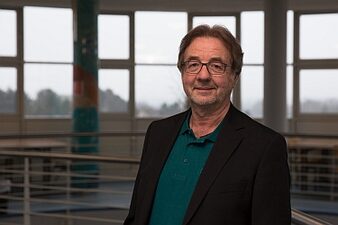About the project
Care is a complex subject, not just for those in need of care, but also for their families and caregivers. The aim to individually take the needs of every single person into account is confronted with the lack of qualified care staff. What frequently results in insufficient advice and care.
These challenges are addressed by the research project 'Care in the Community', supported by the Ministry of Economy, Energy, Industry, Small Business and Crafts of the Land North Rhine-Westphalia from the European Regional Development Fund. Initially, the demands of needs-based care, advice and information in the care sector were assessed by the cooperation partners, together with care support bases, families, clients and a commissioner for senior citizens. These stakeholders come from four communities in Gelsenkirchen, which are greatly heterogeneous in terms of population structure and the conditions within the communities. This enabled community-based consideration of the many different demands of the care for those in need.
IDiAL is, through AG SEELAB, participating in the development of a digital care platform that will facilitate client and community-oriented networking of the stakeholders. The digital platform will, for example, give access to multi-media training content and advice to clients, supplemented by additional community-related data, such as information on local advice centres for clients and their families. As a result of this information, appointments at advice centers may be shorter and clients can find the available relevant care services available faster. In addition, it is hoped that the information flow will be accelerated by an electronic care report.
Alongside the platform, an Android-based mobile smartphone app is being created. By interacting with the digital platform, it will be possible to scan the federal medication plan and to display it both in the app and in the platform. Other central functions of the app are maintaining mobility and increased safety for the user. The app can, e.g. point the way to the nearest public bathroom, or supply a pointer to navigate the user safely home. The address book gives to option to select “favorite people” for quick and easy contact. These will be displayed centrally in the app and can be called directly by simply tapping the screen. In addition, if required, the location of the caller can be transmitted via SMS, so that the “favorite person” can find it directly. In addition, in an actual emergency, an emergency number can be called with one tap, this number must be set beforehand and could, for example, be assigned to a 24-hour hotline of a service provider.
Apart from the care context relevant functions, the app will also give easier access to standard functions of the device, such as contacts and calendar administration, telephone and messaging. The configuration and administration of individual app functions will be controlled via a web interface on the platform for every individual user.
The development and design of the platform and the app will be user-centred and supported by ongoing usability engineering. This will ensure that users with diverse physical and mental abilities can optimally utilize both systems.
Funded by
APD Ambulante Pflegedienste Gelsenkirchen GmbH
BiG – Bildungsinstitut im Gesundheitswesen gemeinnützige GmbH
Generationennetz Gelsenkirchen e. V.
The European Union (EU)
Funding ID
EFRE-0800234
Funding program / research program
- Ministry for Economic Affairs, Innovation, Digitalization and Energy (MWIDE NRW) of the of the federal state North Rhine-Westphalia
- Europäischer Fond für regionale Entwicklung (EFRE)
Cooperation / project partners
Resources
Nowak, S. (2018): Pflege im Quartier - Gute Praxis. Eine vergleichende Beschreibung von Forschungs- und Entwicklungsprojekten zur Verbesserung der Versorgungssituation im Alter. Hg. v. Fachhochschule Dortmund, Fachbereich Angewandte Sozialwissenschaften. Arbeitsgruppe „(Stadt-)Gesellschaften im Wandel“: Dortmund (Pflege und Technik).
Helten, S.; Mähs, M. & Fachinger U. (2017): Szenarienanalyse im Quartier. Zur methodischen Umsetzung in den Projekten "Pflege im Quartier" und "QuartiersNETZ". Hg. v. Fachhochschule Dortmund, Fachbereich Angewandte Sozialwissenschaften. Arbeitsgruppe „(Stadt-)Gesellschaften im Wandel“: Dortmund (Pflege und Technik).

